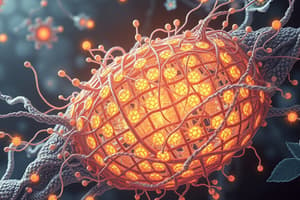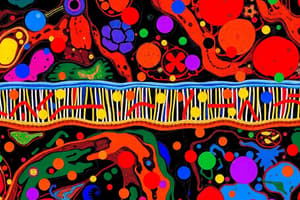Podcast
Questions and Answers
Which of the following best explains diffusion?
Which of the following best explains diffusion?
- Movement of molecules from an area of low concentration to an area of high concentration
- Movement of molecules from an area of high concentration to an area of low concentration (correct)
- Movement of molecules that requires energy
- Movement of molecules through a semi-permeable membrane
Which of the following is most likely to move through the cell membrane by facilitated diffusion?
Which of the following is most likely to move through the cell membrane by facilitated diffusion?
- Na+ (correct)
- Carbon Dioxide
- Oxygen
- Glucose
What is the basic difference between simple diffusion and facilitated diffusion across a cell membrane?
What is the basic difference between simple diffusion and facilitated diffusion across a cell membrane?
In facilitated diffusion, molecules only move with the aid of a protein in the membrane.
Which of the following is least likely to increase the rate of diffusion?
Which of the following is least likely to increase the rate of diffusion?
Which of the following solutions contains the most solute?
Which of the following solutions contains the most solute?
In general, to maintain homeostasis, the relationship between our intracellular and extracellular fluids should be?
In general, to maintain homeostasis, the relationship between our intracellular and extracellular fluids should be?
If a person is severely dehydrated, their extracellular fluids will become hypertonic to the intracellular fluid. What do you predict will happen to the person's cells?
If a person is severely dehydrated, their extracellular fluids will become hypertonic to the intracellular fluid. What do you predict will happen to the person's cells?
Water molecules and small ions enter a cell through?
Water molecules and small ions enter a cell through?
Which of the following best describes osmosis?
Which of the following best describes osmosis?
Passive movement of a solute by a carrier protein is called __________.
Passive movement of a solute by a carrier protein is called __________.
What is the normal direction of calcium transport via the calcium pump?
What is the normal direction of calcium transport via the calcium pump?
What is the energy source used by the calcium pump during its normal operation?
What is the energy source used by the calcium pump during its normal operation?
What concentration gradients are established and maintained by the sodium-potassium exchange pump?
What concentration gradients are established and maintained by the sodium-potassium exchange pump?
Which of the following occurs during a single cycle of the sodium-potassium exchange pump?
Which of the following occurs during a single cycle of the sodium-potassium exchange pump?
Which of the following best describes the difference between active and passive transport mechanisms?
Which of the following best describes the difference between active and passive transport mechanisms?
If the concentration of sodium chloride in the interstitial fluid surrounding cells decreases and the concentration of other solutes remains constant, what will happen?
If the concentration of sodium chloride in the interstitial fluid surrounding cells decreases and the concentration of other solutes remains constant, what will happen?
Cell membranes are said to be __________ because they allow some substances to pass but not others.
Cell membranes are said to be __________ because they allow some substances to pass but not others.
A white blood cell engulfing a bacterium illustrates?
A white blood cell engulfing a bacterium illustrates?
Which of the following lists, in correct order, the phases of interphase?
Which of the following lists, in correct order, the phases of interphase?
Which of the following lists, in correct order, the phases of mitosis?
Which of the following lists, in correct order, the phases of mitosis?
During which of the following phases does DNA replication occur?
During which of the following phases does DNA replication occur?
During which of the following phases does chromatin condense and become chromosomes?
During which of the following phases does chromatin condense and become chromosomes?
During which phase of the cell cycle does DNA duplication, or replication, take place?
During which phase of the cell cycle does DNA duplication, or replication, take place?
During which phase of mitosis do sister chromatids line up at the center of the cell?
During which phase of mitosis do sister chromatids line up at the center of the cell?
During which phase of mitosis do the sister chromatids move apart?
During which phase of mitosis do the sister chromatids move apart?
During which phase of mitosis do nuclear envelopes and the nucleoli reappear?
During which phase of mitosis do nuclear envelopes and the nucleoli reappear?
During which phase of mitosis do the nuclear envelope and nucleoli disappear?
During which phase of mitosis do the nuclear envelope and nucleoli disappear?
What is the name of the process by which the cytoplasm divides in two?
What is the name of the process by which the cytoplasm divides in two?
Mitosis is to somatic cells as meiosis is to ______ cells.
Mitosis is to somatic cells as meiosis is to ______ cells.
The movement of oxygen from an area of high concentration to an area of low concentration is an example of?
The movement of oxygen from an area of high concentration to an area of low concentration is an example of?
A blood cell undergoes crenation when it is placed in a(n) _____ solution.
A blood cell undergoes crenation when it is placed in a(n) _____ solution.
Which of these vesicular transport methods expels material from the cell?
Which of these vesicular transport methods expels material from the cell?
The electric potential difference across the cell membrane is known as?
The electric potential difference across the cell membrane is known as?
Flashcards are hidden until you start studying
Study Notes
Diffusion
- Definition: Movement of molecules from high to low concentration.
- Facilitated diffusion involves protein aid for molecule movement (e.g., Na+).
- Comparison: Simple diffusion occurs without protein assistance.
Concentration and Solutions
- Small concentration gradients slow down diffusion.
- Hypertonic solutions contain the most solute compared to others.
- Isotonic solutions maintain homeostasis between intracellular and extracellular fluids.
Cell Behavior in Solutions
- In severe dehydration, extracellular fluids become hypertonic, causing cells to shrink.
- Dilution of sodium chloride in interstitial fluid leads to cell swelling.
Membrane Transport
- Water and small ions enter cells via channels formed by integral membrane proteins.
- Osmosis is the diffusion of water from higher to lower water concentration across a selectively permeable membrane.
- Facilitated diffusion is the passive movement of a solute by a carrier protein.
Active Transport Mechanisms
- Calcium is typically transported out of cells against its concentration gradient via the calcium pump, powered by ATP hydrolysis.
- Sodium-potassium pump creates high extracellular Na+ and high intracellular K+ concentrations, transporting three Na+ ions out of the cell per cycle.
- Active transport requires energy to move substances against concentration gradients; passive transport works with them.
Cell Cycle and Mitosis
- Interphase phases: G1, S, G2 (where S is when DNA replication occurs).
- Mitosis phases: Prophase, Metaphase, Anaphase, Telophase.
- Chromatin condenses into chromosomes during prophase; sister chromatids align at the center during metaphase and separate during anaphase.
Cytokinesis and Cell Types
- Cytokinesis is the process where the cytoplasm divides.
- Mitosis is associated with somatic cells, while meiosis is associated with sex cells.
Effects of Environment on Cells
- Blood cells undergo crenation (shriveling) in hypertonic solutions.
- Exocytosis is the process used by cells to expel materials.
Membrane Potential
- The difference in electric potential across the cell membrane is termed membrane potential.
Studying That Suits You
Use AI to generate personalized quizzes and flashcards to suit your learning preferences.




